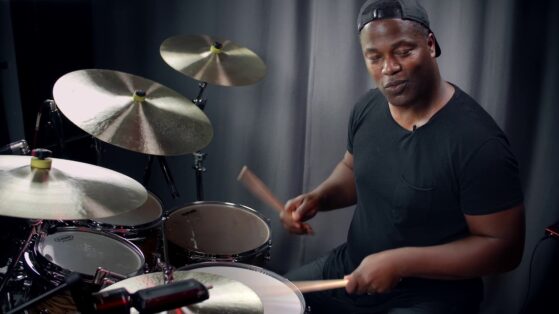How to play drums professionally ?
Playing drums professionally is an art that blends rhythm, technique, and creativity. To play drums professionally, aspiring drummers must balance physical skill with an understanding of music theory, a deep sense of timing, and an intuitive grasp of musical dynamics. This guide provides a roadmap to mastering the drums, from building essential skills and techniques to understanding professional responsibilities and opportunities in the drumming world.

Master the Basics of Drumming Technique
Every professional drummer starts with the basics, regardless of their genre. Here are foundational techniques that form the bedrock of drumming expertise:
Proper Stick Grip: Learn different grip styles (matched grip, traditional grip) and how they impact your playing. Proper grip helps you play more fluidly, avoid fatigue, and reduce the risk of injury.
Hand Techniques: Practice rudiments like single strokes, double strokes, paradiddles, and flams. These techniques are essential to building dexterity, speed, and control.
Foot Techniques: Footwork is just as important as handwork in drumming. Develop solid heel-up and heel-down techniques, as well as complex pedal work like the heel-toe method for double bass drumming.
Basic Drum Patterns: Start with common patterns like rock, jazz, and shuffle beats, as these form the basis for more advanced rhythms. Learning simple patterns at a slow tempo ensures that your timing is rock-solid before progressing.

Develop a Strong Sense of Timing and Rhythm
Professional drummers are often praised for their impeccable timing. Therefore, honing that skill is essential for any aspiring drummer. Here are some effective strategies to help you improve:
Practice with a Metronome: To begin, start at a slow tempo, gradually increasing the speed as your accuracy improves. Not only does a metronome help build internal timing, but it also prepares you for live settings where precision is key.
Subdivide Rhythms: Additionally, breaking down rhythms into smaller components—such as eighth notes, sixteenth notes, or triplets—allows you to master complex rhythms more effectively. This practice enhances your rhythmic clarity and flexibility.
Syncopation and Polyrhythms: Furthermore, understanding syncopation, which emphasizes off-beats, as well as polyrhythms, where you play two rhythms simultaneously, will add depth and dimension to your playing. By incorporating these elements, you can elevate your drumming to new heights.

Expand Your Drumming Vocabulary with Advanced Techniques
To play professionally, you need more than just basic beats; rather, you need an arsenal of advanced techniques that can adapt to any genre or situation.
Ghost Notes and Dynamics: For instance, ghost notes (soft, almost silent hits) add texture to grooves, creating contrast and complexity. By incorporating these subtle accents, you can enhance the overall feel of your performance.
Drum Fills and Rolls: Additionally, it’s essential to master a variety of fills (e.g., linear, cross-stick, and tom-based) and rolls, such as single-stroke and double-stroke rolls. These elements not only provide the bridge between song sections but also elevate energy levels, ensuring a dynamic performance.
Independence and Coordination: Furthermore, professional drummers often play intricate patterns with each limb working independently. Therefore, it’s crucial to practice patterns that involve each limb doing something different to build both independence and coordination. By doing so, you’ll increase your versatility and ability to adapt to various musical contexts.

Understand Musical Styles and Genres
A versatile drummer should be familiar with a wide range of genres, as each genre has its unique rhythm patterns and expectations. A strong musical vocabulary allows you to fit into various musical contexts and increases your marketability:
Rock and Pop: The backbone of many professional drummers’ careers, these styles require solid timing, punchy grooves, and dynamic fills.
Jazz and Swing: Jazz requires more delicate timing, improvisational skill, and an understanding of swing rhythms. It’s essential for jazz drummers to work with brushes as well as sticks.
Funk and R&B: These genres focus on groove and feel, often with a heavy emphasis on syncopated patterns and ghost notes.
Latin and Afro-Cuban: Learning rhythms like the bossa nova, samba, and clave patterns will expand your rhythmic vocabulary. Latin rhythms rely heavily on polyrhythms and foot independence.

Develop Your Ear and Musicality
Professional drummers need to listen as much as they play. Here’s how to build a musician’s ear:
Play Along with Recordings: Playing along to your favorite songs helps you learn song structure, dynamics, and how different drummers use specific techniques.
Transcribe Drum Parts: Transcribing drumming parts from songs teaches you about timing, phrasing, and the importance of accents in different genres.
Practice Improvisation: Improvisation is essential in many genres. Begin with simple patterns, gradually incorporating fills, dynamic changes, and different sticking techniques.

Master Drum Notation and Music Theory
Professional drummers often need to read music for studio sessions, live gigs, or even auditions to play drums professionally. To excel in this area, here’s what to focus on:
Drum Notation Basics: First, learn to read and interpret drum charts, focusing on essential symbols and terms for dynamics, rests, and fills. This foundational knowledge will enable you to follow along seamlessly in various musical settings.
Music Theory: Additionally, understanding basic music theory, such as key signatures, time signatures, and chord progressions, can significantly enhance your playing. By grasping these concepts, you can better anticipate changes in a song, which will allow you to adjust your drumming to support the overall musical arrangement effectively.

Invest in Quality Gear and Learn Maintenance
Quality gear plays a big role in professional drumming, as does the ability to maintain it. Here are some essentials:
Drum Kit and Cymbals: Invest in a versatile kit suited to your preferred genre(s) and a selection of cymbals that provide tonal variety.
Drumheads and Sticks: Experiment with different drumheads for varied tones (e.g., coated for warmth, clear for attack) and sticks for different dynamics and balance.
Maintenance: Learn to tune your drums, replace drumheads when necessary, and take care of your equipment. Properly tuned and maintained gear sounds better and lasts longer.

Create a Practice Routine
A consistent, focused practice routine is crucial for progress. To help you establish an effective regimen, here are some tips:
Warm-Up: First and foremost, start with stretches and rudimentary exercises to avoid injury and increase blood flow. This initial phase prepares your muscles and mind for more intense practice.
Skill Rotation: Furthermore, spend dedicated time on each area—rudiments, foot technique, song practice, and new genres. By rotating through these skills, you not only enhance your overall drumming ability but also keep your practice sessions fresh and engaging.
Track Your Progress: Additionally, record your practices and listen critically. Tracking your progress not only keeps you motivated but also helps identify areas for improvement. This self-assessment allows you to adjust your routine and focus on specific techniques that need more attention.

Gain Experience Through Performing and Recording
Professional drumming isn’t just about skill; rather, it’s about application. Therefore, you should actively seek opportunities to play with other musicians, record, and perform live.
Join a Band or Ensemble: For instance, playing in a group teaches you to communicate musically, blend with other musicians, and adapt to live dynamics.
Record Yourself: Additionally, practicing recording at home or in a studio environment gives you invaluable experience with mics, levels, and session demands.
Live Performances: Furthermore, playing in front of an audience provides invaluable experience. It helps you manage stage presence, timing under pressure, and audience engagement.
By actively participating in these experiences, you will enhance your skills and confidence as a professional drummer.

Cultivate Professionalism and Network in the Industry
Beyond skill, professionalism is essential to play drums professionally and build a successful career. In this regard, several key elements come into play, including networking, being prepared, and respecting others’ time.
Punctuality and Preparation: First and foremost, always arrive early for rehearsals, recording sessions, and gigs. Additionally, bring extra gear and be ready for any situation that may arise.
Networking and Building Relationships: Furthermore, building relationships with other musicians, sound engineers, and promoters is crucial. This not only helps you find gigs but also enables you to get recommendations and develop a solid reputation in the industry.
Social Media Presence: Lastly, leverage social media to share your work, engage with the drumming community, and attract potential clients. Platforms like Instagram, YouTube, and TikTok are particularly popular for sharing drumming videos and tutorials, allowing you to showcase your talent and connect with a broader audience.

Explore Career Paths in Drumming
Professional drumming can lead to various career paths, ranging from live performances to studio work. Here are a few common options:
Live Drummer: Many drummers perform live with bands, orchestras, or as solo artists. This role requires adaptability and the ability to engage audiences effectively.
Session Drummer: Additionally, session drummers collaborate with recording artists to lay down tracks in the studio. This position necessitates quick learning and versatility, allowing them to accommodate different musical styles on short notice.
Drum Educator: Moreover, some drummers choose to teach, either in schools or through online platforms. This career can be rewarding for those passionate about helping others grow musically.
Online Content Creator: Finally, many drummers leverage digital platforms as online content creators. By sharing tips, tutorials, and performances, they build audiences and monetize their efforts through sponsorships and ads. This role offers creative expression and income opportunities.

Stay Inspired and Keep Growing
The journey to play drums professionally never truly ends; there’s always more to learn. Consider taking Drums Lessons Online from The Mystic Keys to enhance your skills. Attend workshops, watch tutorials, study other drummers, and, most importantly, enjoy the journey.








